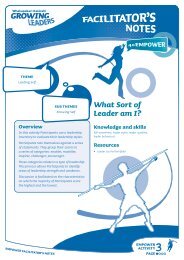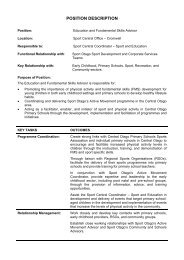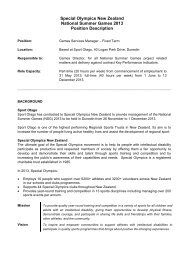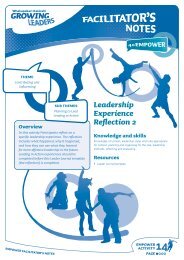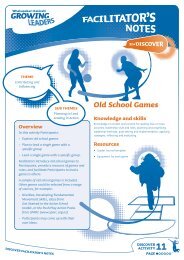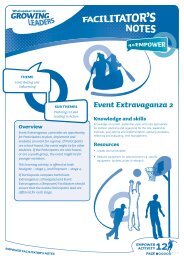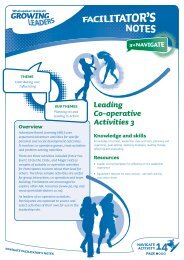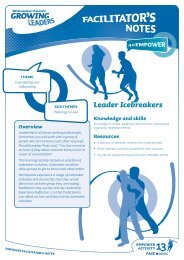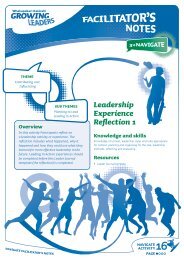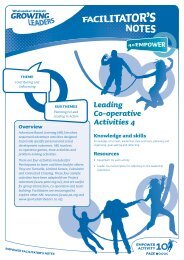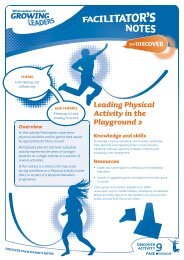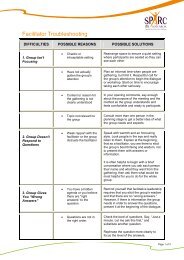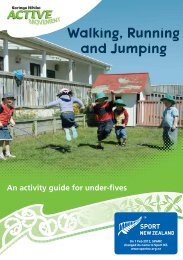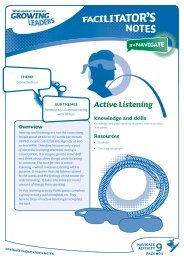Read Getting Set for an Active Nation - Sport New Zealand
Read Getting Set for an Active Nation - Sport New Zealand
Read Getting Set for an Active Nation - Sport New Zealand
Create successful ePaper yourself
Turn your PDF publications into a flip-book with our unique Google optimized e-Paper software.
arriers through the inclusion in physical recreation or sport of persons from diverse<br />
backgrounds. The benefits of physical activity, of positive experiences in recreation<br />
<strong>an</strong>d sport, may be less t<strong>an</strong>gible th<strong>an</strong> economic costs <strong>an</strong>d profits but are no less valid in<br />
<strong>New</strong> Zeal<strong>an</strong>ders' experience.<br />
The Business Research Centre (BRC), <strong>for</strong> the Hillary Commission (1998), noted the<br />
contribution of sport <strong>an</strong>d other physical leisure activities to social cohesion at<br />
individual, family, community <strong>an</strong>d national levels. At the individual level, recreation<br />
<strong>an</strong>d sport c<strong>an</strong> provide a sense of belonging to a group <strong>an</strong>d community. It c<strong>an</strong> build<br />
character through the particip<strong>an</strong>t’s experience of diverse life situations <strong>an</strong>d the positive<br />
support of a coach <strong>an</strong>d team-mates or other athletes <strong>an</strong>d the particip<strong>an</strong>t’s family. The<br />
accept<strong>an</strong>ce of decisions – <strong>an</strong>d of sport’s ups <strong>an</strong>d downs – is integral to sport, as is the<br />
resolution of ethical questions. Similarly, community identity <strong>an</strong>d feelings of<br />
community pride are engendered in a positive social climate that offers <strong>an</strong>d<br />
recognises, recreation <strong>an</strong>d sport achievement. For young people at risk the results of<br />
ventures such as Project K indicate a me<strong>an</strong>s of enh<strong>an</strong>cing social cohesion.<br />
Recreation with its outdoor challenges in <strong>an</strong> environment that causes people to work<br />
together, set high targets <strong>for</strong> a day’s tramp, or share responsibilities in a dem<strong>an</strong>ding<br />
physical situation provides m<strong>an</strong>y opportunities <strong>for</strong> self <strong>an</strong>d group development.<br />
• Increasing Maori participation rates in physical activity, especially if coupled with<br />
successful <strong>an</strong>ti-smoking programmes, has potential <strong>for</strong> marked health<br />
improvement, <strong>an</strong>d consequent individual, wh<strong>an</strong>au, hapu <strong>an</strong>d iwi wellbeing. A<br />
signific<strong>an</strong>t economic benefit would be a welcome by-product of such improvement.<br />
• <strong>Active</strong> particip<strong>an</strong>ts in physical leisure programmes have identified the benefits of<br />
physical activity as fitness, more energy <strong>an</strong>d good feelings <strong>for</strong> particip<strong>an</strong>ts,<br />
experiences of enjoyment or fun, <strong>an</strong>d the association with friends. Fitness<br />
programme org<strong>an</strong>isers noted those who have become involved in physical leisure<br />
had taken the first step towards a healthier lifestyle <strong>an</strong>d, if sustained, that<br />
signific<strong>an</strong>t health benefits would accrue to them (Te Puni Kokiri, 1995).<br />
• The <strong>New</strong> Zeal<strong>an</strong>d Secondary Schools <strong>Sport</strong>s Council in a paper to The Hon.<br />
Margaret Austin, 26.5.99 noted that the values of the <strong>New</strong> Zeal<strong>an</strong>d Curriculum<br />
Framework c<strong>an</strong> be acquired through sport as “The societal benefits are so<br />
import<strong>an</strong>t that the education system c<strong>an</strong>not af<strong>for</strong>d to neglect or minimise sport …<br />
sport education contributes directly to the acquisition of essential lifeskills” (<strong>New</strong><br />
Zeal<strong>an</strong>d Secondary Schools <strong>Sport</strong>s Council, 1999, pp.5-6).<br />
• “Researchers have indicated that leisure activities such as sports may be signific<strong>an</strong>t<br />
in creating opportunities <strong>for</strong> identity development, social me<strong>an</strong>ing, levels of<br />
competence <strong>an</strong>d intrinsic satisfaction in adolescence” (<strong>Sport</strong> Engl<strong>an</strong>d, 1999, p.23).<br />
• The role of outdoor education providing students with opportunities to develop<br />
personal <strong>an</strong>d social skills has been noted in a r<strong>an</strong>ge of Ministry of Education<br />
statements <strong>an</strong>d publications.<br />
Ministerial Task<strong>for</strong>ce on <strong>Sport</strong>, Fitness & Leisure J<strong>an</strong>uary 2001 page 42 of 153



